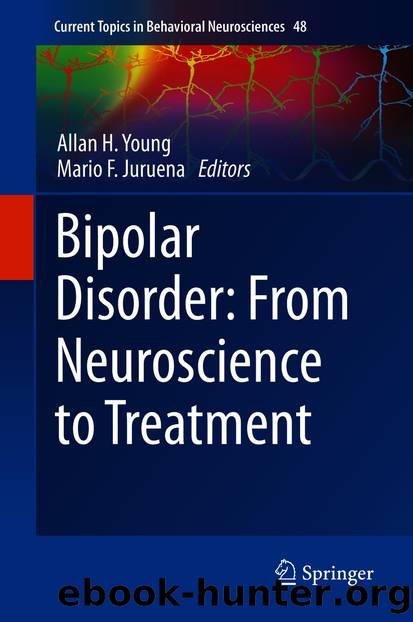Bipolar Disorder: From Neuroscience to Treatment by Unknown

Author:Unknown
Language: eng
Format: epub
ISBN: 9783030721435
Publisher: Springer International Publishing
4 Factors Associated with an Endophenotype Increasing Vulnerability
We can understand better bipolar disorder if we can integrate an interaction of several influences, opening with the genotype, and including the environment experienced during childhood incorporating possible traumas, an individual temperament that confers on the specific skills to cope and deal with different stress. The neuroendocrine system is vital to understand the neurobiology of bipolar disorder (Evans and Nemeroff 1983).
The central stress system is the HPA axis that plays a fundamental role in acute and chronic stressful events (Kendler et al. 2003). Interestingly, the stress in children, such as abuse and neglect, could lead to permanent pathophysiological dysfunctions that are similar to the neurobiology of depressive and bipolar patients. Personality traits and temperament also have an essential influence on the sensibility of stressors and life events. Likewise, a predisposition to live a negative feeling or to be socially repressed could be a consequence of emotional or neuroendocrine stressful life event (Rijsdijk et al. 2001; Kagan et al. 1987).
Animal and human studies indicated that early life stress could develop permanent dysfunctions, and this impairment in the HPA axis may increase the vulnerability to bipolar disorders. Persistently increased activity of the HPA axis has also led to more frequent relapses and treatment resistance (Holsboer and Barden 1996).
A wide variety of stressors have been shown to stimulate the HPA axis. For this reason, glucocorticoids have been described as key molecules to develop the stress reaction and severe physiopathology situations. The persistent release of glucocorticoids is a combination of recent current stress or an epigenetic vulnerability to increase the HPA axis activity and severe damages in central nervous structures (mainly the hippocampus), which are crucial for controlling this system and cognition (Davis et al. 2018; Gallagher et al. 2014, 2015).
There is a hypothesis that this damage, in turn, leads to a feedforward circuit in which permanent stressors stimulate the overproduction of GCs indeterminately (GC cascade). Due to the ability of higher release of GCs to alter cell metabolism, which could trigger a large number of recurrences in bipolar, it is considered that the overproduction of these hormones directly contributes to several behaviors and psychological damages related to frequent chronically stressful events in bipolar disorders (McEwen 2001; Watson et al. 2007). Despite the popularity of the cascade hypothesis, several studies described the release of excess of GCs, on the GR/MR can develop stressful reaction and trigger treatment-resistant affective disorders (Juruena 2014).
Thus defined, insufficient signaling by the GCs implies the endpoint of the GC function, the key research query is if GCâs message is arriving appropriately to HPA axis after stressful life events. In some subjects with hyperactivity of HPA axis and high levels of GCs, there may be an insufficiency of these hormones if the reduced sensitivity to GC, in relevant target tissues, overcomes the excess of circulating hormone (Raison and Miller 2003; Sapolsky et al. 2000).
Download
This site does not store any files on its server. We only index and link to content provided by other sites. Please contact the content providers to delete copyright contents if any and email us, we'll remove relevant links or contents immediately.
Should I Stay or Should I Go? by Ramani Durvasula(7652)
Why We Sleep: Unlocking the Power of Sleep and Dreams by Matthew Walker(6694)
Fear by Osho(4727)
Flow by Mihaly Csikszentmihalyi(4685)
Rising Strong by Brene Brown(4448)
Why We Sleep by Matthew Walker(4433)
The Hacking of the American Mind by Robert H. Lustig(4373)
How to Change Your Mind by Michael Pollan(4354)
Too Much and Not the Mood by Durga Chew-Bose(4336)
Lost Connections by Johann Hari(4169)
He's Just Not That Into You by Greg Behrendt & Liz Tuccillo(3889)
Evolve Your Brain by Joe Dispenza(3668)
The Courage to Be Disliked by Ichiro Kishimi & Fumitake Koga(3482)
Crazy Is My Superpower by A.J. Mendez Brooks(3394)
In Cold Blood by Truman Capote(3374)
Resisting Happiness by Matthew Kelly(3337)
What If This Were Enough? by Heather Havrilesky(3308)
The Book of Human Emotions by Tiffany Watt Smith(3292)
Descartes' Error by Antonio Damasio(3270)
